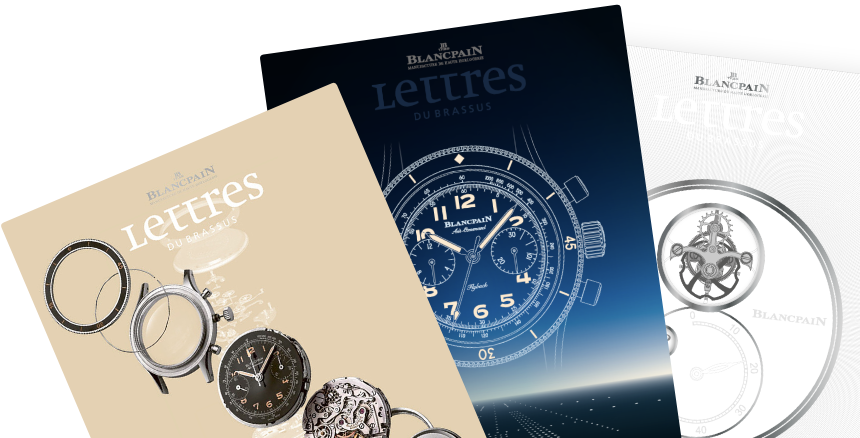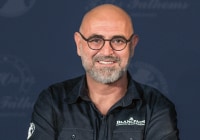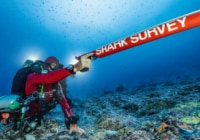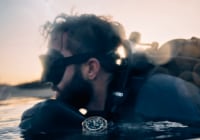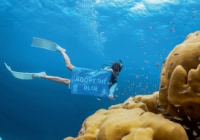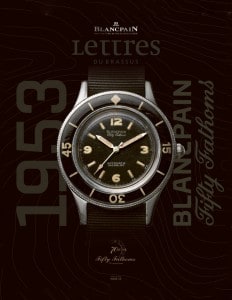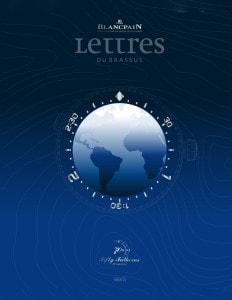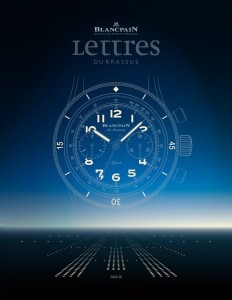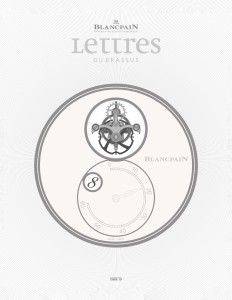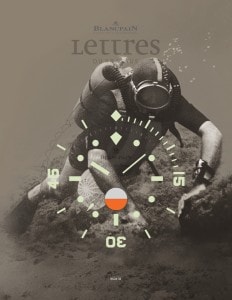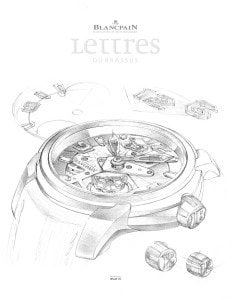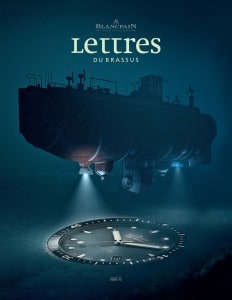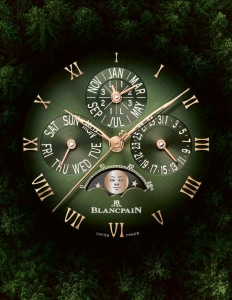
Search in Issues
Chapters
List of parts
Chapter 9
The PADI and Blancpain Partnership TURNS HOPE INTO ACTION
Another step towards the goal of protecting 30% of our oceans by 2030.

THE GOAL OF THE ADOPT THE BLUE PROGRAM IS TO CREATE A GLOBAL INVENTORY OF 10,000 UNDERWATER SITES that will help create an economic case for ocean protection, as the diving industry represents billions of dollars in tourism revenue for coastal communities.
In an era where our planet’s oceans face unprecedented threats, the collaboration between PADI® (Professional Association of Diving Instructors) and Blancpain stands as a beacon of hope and action. This partnership, crystallized through the innovative Adopt the Blue™ program, represents a significant stride towards ocean conservation. Launched in 2022 by PADI and the PADI AWARE Foundation™, this initiative aspires to establish the world’s largest network of conservation sites, safeguarding crucial marine habitats and species on the brink of extinction. Adopt the Blue can fill a critical stage in the creation of Marine Protected Areas (MPAs) with the backing of the global PADI Community of PADI Dive Centers and Resorts, PADI Professionals, divers, and ocean torchbearers.
Over the next decade, the Adopt the Blue program will serve as the connective tissue driving forward PADI’s Blueprint for Ocean Action, a collaborative conservation roadmap created by PADI and its global non-profit policy arm, the PADI AWARE Foundation. This initiative empowers both divers and non-divers with clear, actionable steps to create meaningful ocean change at both local and global levels. These local initiatives, when replicated and scaled up, will help drive global impact and provide critical data sets that can inform and influence government decisions on new and existing Marine Protected Areas (MPAs). Leveraging the extensive network of PADI Mission Hubs—which includes 6,600 PADI Dive Centers and Resorts and over 126,000 PADI Professional Members worldwide—the program is poised to scale local actions into a formidable global movement.
The Adopt the Blue program builds on PADI AWARE’s successful ‘Adopt a Dive Site’ initiative, which engaged the dive community in marine debris citizen science and research. By design, Adopt the Blue expands on this idea through its ability to mobilize the global PADI dive community in a unified path of action that addresses the numerous threats facing our oceans. The PADI AWARE Foundation, under the guidance of Director Danna Moore, has outlined a bold vision: “Our goal is to create a minimum of 10,000 Adopt the Blue sites, working with local communities and PADI operators to accelerate local conservation efforts where they are most needed, and to actively contribute to protecting 30% of the ocean by 2030.” This ambitious target underscores the program’s potential to galvanize global action and foster significant environmental impact that can accelerate sustainable development goals for countries across the planet. Coupled with PADI’s global reach, this will provide an unprecedented opportunity to significantly advance ocean conservation.
The primary goal of the Adopt the Blue program is to create a global inventory of underwater sites, collecting information on locations, ecosystems, and emerging conservation issues. Sites associated with the program will demonstrate the economic value they bring to local and national economies. Additionally, Adopt the Blue will also identify the potential of sites to become MPAs, if not already protected, helping governments to meet their international conservation commitments. Once established, these sites will be supported through community grants, citizen science programs, targeted conservation projects, and policy advocacy campaigns, all underpinned by PADI’s goals on climate change, marine debris, coral reef restoration, and the protection of habitats and vulnerable species.
A VITAL NETWORK FOR THE OCEAN MOVEMENT
There is an imminent need for a program such as Adopt the Blue to fill a fundamental gap for the broader ocean conservation movement. Developing a global network that can be engaged on a wide range of conservation issues will provide a delivery mechanism for PADI as well as strategic partners to reach an engaged and motivated underwater community quickly and effectively. An established Adopt the Blue network will offer a platform for testing innovative marine technologies, implementing large-scale and long-term citizen science data collection, introducing cost-effective seabed monitoring projects, and scaling up restoration efforts. It will also have the ability to activate ocean advocacy campaigns with partners at local, national, and international levels.
This vital network will not only provide the underwater eyes needed to track human impact on the marine world but will also create an economic case for ocean protection, as the diving industry represents billions of dollars in tourism revenue for coastal communities. “Adopt the Blue combines meaningful, direct actions that PADI’s ocean torchbearers take into a single place that can help inform scientists, policy makers, government authorities, and the public,” explains Drew Richardson, PADI President and CEO. Diving tourism significantly supports the blue economy by generating revenue through dive-related services, such as diver tourism, equipment purchases and rentals, and dive training courses, which create jobs and stimulate local businesses. It promotes sustainable practices as divers often advocate for marine conservation, contributing to the protection and restoration of underwater ecosystems.


Blancpain President and CEO Marc A. Hayek and PADI President and CEO Drew Richardson have joined forces to fundamentally increase the number of Marine Protected Areas (MPAs) around the globe over the coming decade.

By engaging PADI divers in citizen science, ADOPT THE BLUE HAS THE POTENTIAL TO HARNESS THE POWER AND PASSION OF MILLIONS, mobilizing them as a collective underwater force for good.
Over time, all participants, from large-scale operators to individual supporters, will have the ability to become actively engaged in marine conservation at any number of Adopt the Blue sites, through campaigns and partnerships—all tied to PADI’s Blueprint and commitment to protect 30% of the ocean by 2030. The opportunities will be wide-ranging for divers and non-divers alike, and can include targeted political advocacy, project participation or conservation volunteering, and regenerative tourism.
PASSING THE TORCH FOR OCEAN CONSERVATION
On average, a million dive certifications are issued by PADI In- structors every year. It is because of this massive reach that inspires PADI’s preferred and optimistic view that we can, by working collaboratively with partners like Blancpain, design and implement solutions for a healthier and more balanced coexistence with nature. With 29 million certifications to date, PADI operates as the world’s largest network of dive centers, dive instructors and recreational divers and snorkelers. In 2018, PADI recast its mission from ‘The Way the World Learns to Dive®’ to ‘Create one billion torchbearers to seek adventure and save the ocean.’ “This enhanced commitment to conservation was a deliberate call to action for divers and non-divers worldwide to join a unified effort to create lasting and meaningful change, restoring balance between humanity and the ocean,” explains Katie Thompson, Senior Director of Environment & Sustainability at PADI. “By uniting this global community of ocean torchbearers, we can transform hope into action, working together to restore, preserve, and conserve the vital ecosystems essential to our well-being.”
THE ‘DIVING’ FORCE BEHIND ADOPT THE BLUE
As data scarcity often limits conservation progress, citizen science lies at the heart of Adopt the Blue initiatives. From the cenotes in Mexico to the reefs of Raja Ampat, divers hold a passport to explore some of the most wild, pristine, and beautiful places on Earth. As the quintessential underwater eyes of the ocean, divers have also borne witness to the massive changes occurring in this beloved underwater wilderness. Over the past several decades, ocean health has significantly deteriorated due to climate change, with rising sea temperatures leading to widespread coral bleaching and the decline of marine biodiversity. Ocean acidification, driven by increased CO 2 absorption, is significantly disrupting marine ecosystems by weakening the calcium carbonate structures essential for coral reefs and shellfish, leading to their decline. But there is hope in the growing community of underwater explorers, who can apply the skills they learned as divers to help protect the marine ecosystems that are vital to supporting life on this planet.
Over the past decade, there has been a growing movement of divers-turned-underwater-citizen-scientists. As explorers and protectors of the underwater realm, this group of diver enthusiasts and professionals contribute to a wide array of research and conservation projects, leveraging their unique access to underwater environments. By participating in data collection and monitoring activities, divers help scientists gather critical information on marine biodiversity, the health of coral reefs, and the impact of climate change on ocean ecosystems. Through these activities, divers foster a deeper connection with the ocean and its inhabitants, often becoming advocates for marine conservation. Their firsthand experiences and observations provide invaluable insights that complement scientific research, making underwater citizen science a collaborative and impactful approach to preserving our oceans. This synergy between divers and scientists not only enhances our understanding of marine ecosystems but also empowers communities to protect them.
A cohesive and globally applied methodology like Adopt the Blue that is aligned with the global agenda for sustainable development can accelerate outcomes on a grander scale. Such an approach has the potential to harness the power and passion of millions, mobilizing them as a collective underwater force for good. By fostering a community of environmentally conscious divers and empowering them with the skills and opportunities required to implement solution-based initiatives with lasting global impact, we can accelerate progress and positive change for our ocean planet.
PATHWAY TO PROTECTION
Adopt the Blue aims to accelerate the creation of MPAs for protection and conservation by providing multiple pathways for PADI Dive Centers, Resorts, Professionals, divers, and other ocean enthusiasts to actively participate in conservation on both a local and global level. Using diver education linked to PADI’s Blueprint for Ocean Action conservation programs, PADI trains and enables divers to collect data in Adopt the Blue sites across the globe. The data uploaded to the AWARE database can be used to inform scientific research and aid policy makers and local governments in their decision-making regarding MPA creation, expansion, monitoring, and regulation.
By providing globally consistent and relevant training in underwater citizen science to millions of PADI divers, we establish a dependable and ongoing data source that is invaluable to marine conservation efforts. Divers can provide governments with data to meet debris monitoring and reporting requirements, perform surveys on vulnerable and endangered species critical to preserving marine ecosystem balance, restore blue carbon habitats like seagrass or mangroves, or engage in coral monitoring projects that can help predict and prevent coral bleaching events. PADI divers are thus fulfilling a vital role in ocean conservation that is essential to understanding the priorities and needs for increasing the amount of MPAs.
“Over the years, we have been consistently amazed by the passion and readiness of the diving community to take action where and when it’s needed. With the scale and support of our dive operators, divers and ocean torchbearers will be able to help countries meet their ocean conservation commitments and accelerate the creation of coastal MPAs,” explains Moore.

Divers throughout the Adopt the Blue network aim to increase the resilience of their local communities and marine ecosystems through data collection that will inform ocean protection measures.

Divers nurture fragments in a coral nursery.

Divers document changes to coral reef health over time.

Researchers monitor seagrass meadows to measure the effectiveness of local protection efforts.
The program does not require Adopt the Blue sites to be actual ‘dive sites’, meaning PADI Dive Centers and Professionals can identify any underwater site anywhere in the world. These sites could contain an iconic habitat or species, such as mangroves, shallow water seagrass beds, nursery sites, or breeding grounds. Quarries, freshwater sites, a portion of a riverbank: these all qualify for the program, as they provide economic benefits to local communities and contribute to PADI’s overall vision of restoring balance between humanity and the ocean. Once the sites are chosen and listed on the Adopt the Blue platform, the PADI AWARE Foundation can coordinate the appropriate local, regional, and national conservation efforts. The application process is simple and can be completed in the PADI AWARE Conservation Portal in less than ten minutes. Once completed, sites will be displayed on the Adopt the Blue Global Action map and housed in the PADI AWARE database. Any relevant data collected will be used to assist local governments, partners, and non-profits with marine protection initiatives.
One pathway to reach the 30% protection target is by directing in-country resources to existing and potential MPAs. With the support of Blancpain, PADI AWARE continues to invest and activate community members through the Adopt the Blue program. In June 2024, just two years after its launch, there were more than 2,200 Adopt the Blue sites, attaining the critical mass needed to begin deeper engagement into the largest network of underwater sites for conservation action. Commencing in 2023, AWARE focused their MPA efforts on establishing a proof of concept for Small Island Nations that would validate the approach and scale it for MPA creation. Working closely with local partners in Barbados to help meet protection targets set by the national government, the PADI AWARE Foundation attended and led community workshops with a range of stakeholders to discuss solutions for coral restoration, marine debris removal, and the tracking of vulnerable species.
The team also addressed local needs based on feedback from partners. With more than 80% of the local population in Barbados unable to swim, they committed to providing water awareness training to 500 local children. To date, more than 300 children have participated. Shortly after their water awareness session, six teenagers from the program expressed interest in becoming PADI certified. “Every child who participates in the PADI AWARE swim program is given the opportunity to not only become a future dive professional, but also an ocean guardian in Barbados,” explains Andre Miller, community partner and owner of Barbados Blue, a PADI 5-Star Dive Resort. “In the end, we will protect what we can see.” In 2024, AWARE will seek to establish further collaboration on a national level and connect the youth program into a broader marine protection plan. This flagship MPA project in Barbados provides a robust and valid, in-demand working model that can be globally implemented to provide real-time data to inform policy and protection measures in key areas of MPA development.
EMPOWERING LOCAL COMMUNITIES
Adopt the Blue is closely tied to the PADI AWARE Community Grant Program, which funds critical conservation efforts in local communities and aims to empower local dive centers and operators to lead conservation initiatives that have a lasting impact on marine ecosystems. Launched in 2022 with the aim of providing $1 million USD in funding to local communities by 2025, the grant can be a beacon of hope for Adopt the Blue participants, as it provides the resources needed to drive conservation action at adopted sites. AWARE grants will foster both ocean preservation and indigenous community support, serving as a force for good for both humanity and the ocean. Engaging and supporting local people and habitats is encapsulated in the first part of PADI AWARE’s mission: to drive local action. As a founding partner of the Adopt the Blue program, Blancpain has committed to funding an annual sub-grant over the next five years that goes directly to MPA projects at ground level.
PADI AWARE MPA COMMUNITY GRANT: BEQA ADVENTURE DIVERS
In the heart of the South Pacific, the vibrant coral reefs and di- verse marine life of Fiji’s Shark Reef Marine Reserve (SRMR) are facing increasing pressures. These ecosystems, known for their stunning biodiversity, are crucial for local communities, tourism, and global marine health. However, the COVID-19 pandemic brought an unexpected challenge: with decreased oversight and enforcement, illegal fishing (or poaching) surged, threatening the delicate balance of these underwater worlds. To address these pressing issues, a PADI AWARE MPA Community Grant was awarded to Beqa Adventure Divers, a renowned diving operator in Fiji dedicated to regional conservation efforts in the SRMR. For Beqa Adventure Divers, this grant provides a critical lifeline for assessing and restoring the health of marine life and habitats within the SRMR. The ultimate goal of Beqa Adventure Divers’ conservation efforts is to work towards a more abundant and resilient future for the Marine Reserve. By addressing the immediate impacts of poaching and actively restoring key components of the ecosystem, these efforts aim to create a positive feedback loop that enhances the overall health of the reef.
One of the grant’s main objectives is to support comprehensive surveys of the MPAs within the SRMR. These surveys focus on fish species and their abundance, providing essential data to determine the impact of poaching during the pandemic. By comparing this data with pre-pandemic records, researchers can identify shifts in population dynamics and assess the extent of poaching-related impacts.
“Magical, Wondrous, Vulnerable, Finite.” These are the words that Natasha Marosi, Director of Conservation at Beqa Adventure Divers in Fiji, used to describe our ocean. They also explain why Marosi and her team are dedicated to rehabilitating the nearby reserve. The SRMR rehabilitation project will focus on assessing the degradation of the Shark Reef Marine Reserve through biodiversity assessments and fish counts. In particular, Beqa Adventure Divers will focus on key species like groupers, jacks, parrotfish, surgeonfish, emperors, and snappers to assess how much damage pandemic poaching may have caused. Initial findings have indicated a noticeable decline in certain fish populations, especially those targeted by poachers, such as groupers and snappers. This decline not only disrupts the local food web but also affects the overall health of the reef ecosystem. The data collected will be instrumental in formulating targeted conservation strategies and lobbying for increased protection and enforcement within the reserve.

Inspiring the future generations of ocean guardians for the marine park in Barbados: as part of the Adopt the Blue project in Barbados, AWARE is working with PADI Dive Operator Barbados Blue and the local government to provide swim and water safety training to 500 young Bajans.

The team from Beqa Adventure Divers monitors who is using the AWARE MPA Community Grant to help assess and restore the health of the Shark Reef Marine Reserve in Fiji.
Future follow-up surveys indicating “rapid rebound rates for many depleted fish species” would be the ultimate success story for this project according to Marosi. If key fish species were on the rebound and populations were recovering at a steady rate, it would “give us hope that biodiversity could be restored, and the Shark Reef Marine Reserve could once again be a sanctuary not only for sharks but [for] every creature calling the reef ecosystem home,” she concludes.
Beyond assessing fish populations, the grant supports active restoration efforts aimed at bolstering the overall health of the SRMR’s ecosystems. Two key components of this restoration work are coral and giant clam restoration. Giant clams, often referred to as the ‘jewels of the reef ’, play a crucial role in reef ecosystems. They filter water, provide habitats for marine organisms, and contribute to the reef ’s overall biodiversity. Unfortunately, giant clams are also highly vulnerable to poaching. The restoration program involves breeding giant clams in controlled environments and then reintroducing them to the wild. These clams are strategically placed in areas where they can thrive and contribute to the reef ’s ecological balance. Monitoring and protection measures are also implemented to ensure their survival and growth.

PADI AWARE’s Global Shark & Ray Census will be THE WORLD’S LARGEST UNDERWATER CITIZEN SCIENCE PROGRAM designed to protect sharks and rays from extinction.
PADI AWARE MPA COMMUNITY GRANT: ACQUA SUB
Brazil’s coastal regions boast a rich diversity of marine life and vibrant ecosystems that are critical to the environment and local economies. Among these, the Setiba MPA in Guarapari stands out for its significant biodiversity. However, ensuring the effectiveness of protection measures in MPAs requires continuous monitoring and data collection. Recognizing the importance of this work, PADI AWARE awarded a MPA Community Grant to Acqua Sub, a PADI 5-Star Instructor Development Center in Guarapari, Brazil, to support their vital conservation efforts in surveying fish populations and assessing seabed cover within the Setiba MPA to determine the predominant type of cover and to record any damage and potential threats. Acqua Sub aims to provide actionable data that can inform local government policies and improve the effectiveness of the Setiba MPA.
Acqua Sub will conduct comprehensive surveys of fish populations within the MPA that are essential for understanding the health and dynamics of marine life there. They will also assess the impact of protection measures to determine whether the MPA is sufficient to maintain the reef fish populations present in Guarapari, Brazil. Data will be collected on 25 field expeditions through visual observation during scuba diving, freediving, and remote marine monitoring. Preliminary surveys have already revealed variations in fish populations across different zones of the MPA, highlighting areas of high biodiversity and zones that may be under stress. By comparing these findings with historical data, researchers can identify trends and potential threats, such as overfishing or habitat degradation. This in- formation is critical for advising the local government on any necessary adjustments to MPA boundaries or enforcement strategies to enhance protection.
“I believe that this grant signals the start of future action implemented with the local community, encouraging participation as citizen scientists,” states Ivan Costa Santos, founder of Acqua Sub. “I will consider this a success if I manage to convince the local government of the need to increase environmental enforcement and expand the Setiba MPA from Três Ilhas to Ilha Escalvada and Ilha Rasas.”
MPAs are powerful and effective methods for protecting ocean life. They are clearly defined geographic spaces managed for long-term conservation. MPAs protect biodiversity, enhance resilience, bolster fisheries, and serve as an ‘insurance policy’ against other fisheries’ management policies. They are critical to protecting and restoring endangered species and degraded ecosystems. That said, they are only effective if enough protection is afforded to marine life, if extraction activities are prohibited, and if there is sufficient enforcement procedures and staff. “I know this goal is very ambitious for this project,” states Santos. “However, I believe it is just the beginning, the kickoff.” The work will be carried out in partnership with IEMA, the environmental agency in the governing state of Espirito Santo. As part of the program, two areas will be reserved for dive center students who are training to become PADI Professionals in order to join the expeditions. “I feel very accomplished doing this work and leaving a legacy for generations to come,” concludes Santos.
EXPANDING OUR EFFORTS
In 2025, PADI AWARE will add another global initiative supported by Blancpain to its menu of citizen science programs: the PADI Global Shark & Ray Census. Following the successful ‘Dive Against Debris’ model, the Shark & Ray Census will provide an ongoing and scientifically valuable method to monitor the health of some of the most threatened marine species on the planet, and when deployed, will be the world’s largest underwater citizen science program designed to protect sharks and rays from extinction.
The Global Shark & Ray Census directly supports PADI’s Blueprint for Ocean Action by aligning with its goals and strategies for protecting vulnerable and endangered species and expanding MPAs. Increased data on the populations of sharks and rays can help protect vulnerable species from extinction, while the location data collected through the census can contribute to the establishment and expansion of Shark Protected Areas. The program invites everyone in or on the water (divers and non-divers alike) to contribute data by logging sightings of any shark and ray species they encounter or by monitoring specific sites to track population trends. Once collected, the data will undergo rigorous scientific analysis and will be used to advocate for the adequate protection of vulnerable shark and ray species, thus promoting healthy populations.


Image: Jayne Jenkins
The data collected through the Global Shark & Ray Census can HELP EXPAND CRITICAL SHARK AND RAY HABITAT PROTECTION MEASURES, contribute to the development of Marine Protected Areas (MPAs), and promote sustainable and responsible shark and ray tourism.
Two decades ago, Blancpain and the PADI AWARE Foundation launched the Whale Shark Project to document and understand the behaviors and life patterns of whale sharks. This initiative established a photo-identification network where divers and ocean enthusiasts contributed photographs of whale sharks, helping to build a comprehensive database of these majestic creatures. The project aimed to gather critical data to support conservation efforts and raise awareness about the need to protect whale sharks from threats such as habitat destruction and overfishing. The Whale Shark Project was one of Blancpain’s first major conservation initiatives, reflecting the brand’s long-standing commitment to ocean preservation. This effort was part of a broader strategy that included collaborations with scientists, environmentalists, and organizations dedicated to marine conservation. By engaging the global diving community, Blancpain and PADI AWARE encouraged divers to become citizen scientists, contributing valuable data that informed protection strategies for these vulnerable species.
“Blancpain has long been committed to real engagement in ocean conservation issues. Working together will be a force multiplier in achieving our shared ocean conservation goals,” explains Dr. Drew Richardson, CEO of PADI Worldwide and Chairman of the PADI AWARE Foundation. “Blancpain’s expanded support of PADI’s Vulnerable Marine Species Program forges a juggernaut combining the Blancpain Ocean Commitment with PADI’s Blueprint for Ocean Action in advancing positive ocean change.”
The PADI AWARE Foundation is among the world’s most successful shark and ray conservation organizations, with a 30-year track record of implementing groundbreaking conservation measures for the oceanic whitetip shark, great hammerhead shark, giant manta ray, whale shark, and shortfin mako shark, along with many other vulnerable species. In November 2022, PADI helped secure significant protection for requiem sharks at the 19th CITES1 meeting in Panama City, where government representatives agreed to restrict international trade in all requiem sharks (one of the biggest families of species), all hammerhead sharks, and all guitar sharks, and to add an extra 60 species to the list of sharks protected by Appendix II. This positive outcome follows PADI being asked by the host nation Panama to provide specialist advice and research to all attending government representatives to help secure support for a critical vote to double the amount of protected shark and ray species. To date, the PADI AWARE Foundation and PADI have helped secure protection measures for over 105 species of sharks and rays.
“With a growing base of divers interested in shark conservation, the Global Shark & Ray Census enables divers to function as diving citizen scientists who can collect high-quality data and information about vulnerable shark species. Engaged divers across the planet who choose to participate will directly help accelerate national and global protection measures where they are needed most,” continues Richardson.
1 Convention on International Trade in Endangered Species of Wild Fauna and Flora


ADOPT THE BLUE offers a promising path forward in the FIGHT TO PRESERVE OUR BLUE PLANET.
A GLOBAL MOVEMENT FOR OCEAN CONSERVATION
The vision of Adopt the Blue transcends traditional conservation efforts, aiming to foster a global movement characterized by meaningful local action. By enabling PADI dive operators and the wider diving community to actively participate in ocean conservation, the program builds a robust network of environmental stewards dedicated to protecting marine ecosystems.
The partnership with Blancpain amplifies the reach and impact of Adopt the Blue, leveraging the brand’s historical commitment to oceanic exploration and conservation. Together, PADI and Blancpain are not only preserving marine habitats but also inspiring a new generation of divers and ocean advocates to take proactive roles in conservation.
As a strategic partner of PADI’s Blueprint for Ocean Action and the founding partner of the PADI Marine Protected Areas program and its flagship initiative, Adopt the Blue, Blancpain brings a legacy that is deeply intertwined with ocean exploration and preservation. This alliance is more than a symbolic gesture; it is a powerful combination of expertise and resources dedicated to protecting our blue planet. Together, PADI and Blancpain are committed to creating the largest inventory of MPAs globally in testament to their shared vision and dedication to ocean preservation.
Adopt the Blue is a shining example of hope and exemplifies how strategic partnerships and community-driven initiatives can generate a substantial environmental impact. Through the combined efforts of PADI, PADI AWARE, and Blancpain, working with countless passionate divers and ocean torchbearers, this initiative is set to transform the landscape of marine conservation. As we move towards the goal of protecting 30% of our oceans by 2030, the collaborative spirit and unwavering dedication of these stake-holders offer a promising path forward in the fight to preserve our blue planet.


Blancpain President and CEO Marc A. Hayek dives alongside PADI President and CEO Drew Richardson holding the Adopt the Blue flag off the Cap d’Antibes peninsula.
Other issues
Don't miss the latest issue
Sign Up for New Releases